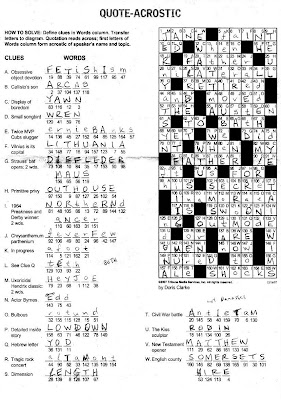(This post is relevant to the next book I'll be reviewing, later today or early tomorrow)
I've seen an article recently that reported the varying opinions of psychologists, whether we think in words, and whether we need words in order to think. Seeing an animal ponder, then visibly come to a decision, I have to conclude there are but two possibilities: if animals other than humans are entirely nonverbal, then words are not needed for thought; but if words are needed, then all thinking animals have language at some level.
Based on my experience, I'd say words are not always needed, but they sure help (and as an aside, I think the varied vocalizations and other signs we see in all mammals and birds indicate they have "words" that are meaningful to them. It is strange that a pet dog can learn to respond properly to many human words, and with little effort, but humans don't seem able to learn the dog's words!)
 Yesterday, after working out this puzzle by Doris Clarke, I said to my wife, "These Acrostics must be a lot harder to make than crosswords. The writer has to find a quote that contains all the letters in the title of a book and the name of its author, then produce twenty or more partial anagrams."
Yesterday, after working out this puzzle by Doris Clarke, I said to my wife, "These Acrostics must be a lot harder to make than crosswords. The writer has to find a quote that contains all the letters in the title of a book and the name of its author, then produce twenty or more partial anagrams."As I spoke, I realized that the first part is almost laughably simple. The quote in this puzzle contains 165 letters. Just statistically, we know that almost any clip of English containing 150-200 letters will have at least one occurrence of twenty or more of the twenty-six English letters. The search for a usable quote is a bit harder if the title or author's name contains Q, X, or Z...but only a little bit. The real work is in using up all the letters in other words and phrases, the anagrammatic clues.
These days, there are a number of computer programs that will make anagrams from as long a string of letters as you like. But I suspect a number of puzzle purists still do most of their work without computer help, using anagram dictionaries and other helps. The creativity comes in having a good reserve of words and 2-3 word phrases that are "just tricky enough" but "just familiar enough" to make the puzzle more enjoyable.
For example, the 23 clues in this puzzle contain only these few "banal" items: YAWN, WREN, ROTUND, and LENGTH. The rest require plenty of literary, sports, geographic, biblical, and popular culture knowledge. I suspect that very few anagram dictionaries include FEVERFEW, ARCAB, or ALTAMONT, not to ignore SOMERSETSHIRE or ANTIETAM! I have to admit, being quite ignorant of sports trivia, I didn't "get" ERNIE BANKS until the only letter missing was the K! And you can see a couple of my musings there, where I had a first thought, but knew I didn't have a unique solution for a clue, because I also knew other possible answers with the right number of letters. By the way, I wonder how many folks out there have ever seen the word "uxoricidal", and how many know its meaning.
Just in case you're curious, I use CAPS when I am sure of the word or letter I am using, and lower case otherwise. Sometimes I've gone back and replaced a "d" with a "D" and so forth, but once I have about half the letters and clues, the rest of the solution usually proceeds too quickly for me to bother. I just write it all in.
But the point of my musings today is that I had thought to myself a few times about how hard it must be to create an Acrostic puzzle, but it wasn't until I spoke with my wife about it that the process became clear. Sometimes I've solved an enigma by thinking about how I'd explain it to someone; other times, it has required me to actually do the explaining out loud. Hearing what I have to say helps me get my thoughts straightened out. I suspect this phenomenon is quite universal.



No comments:
Post a Comment